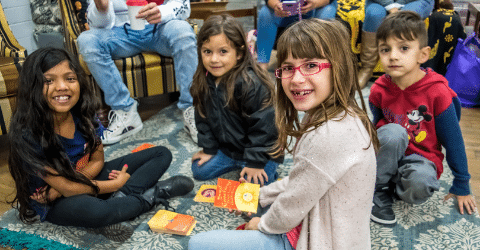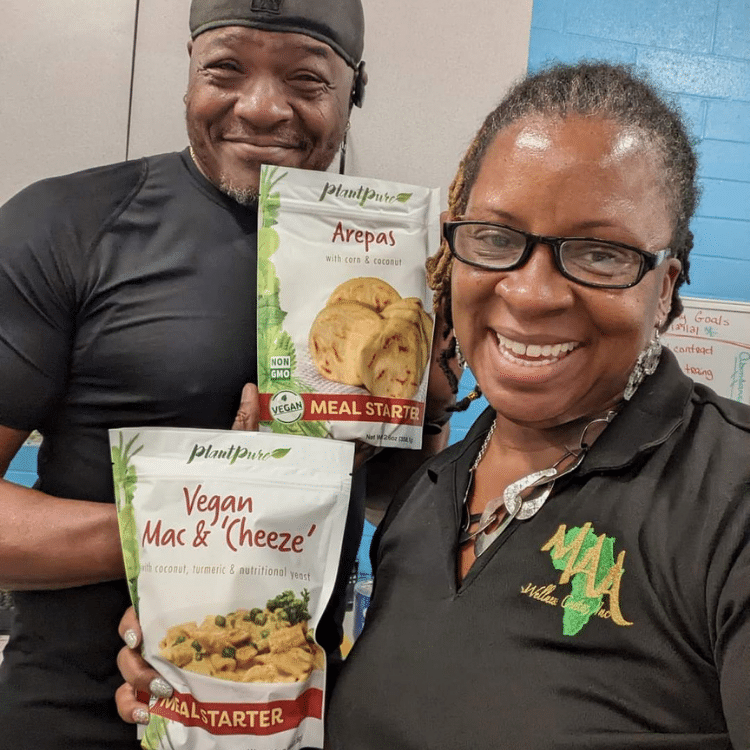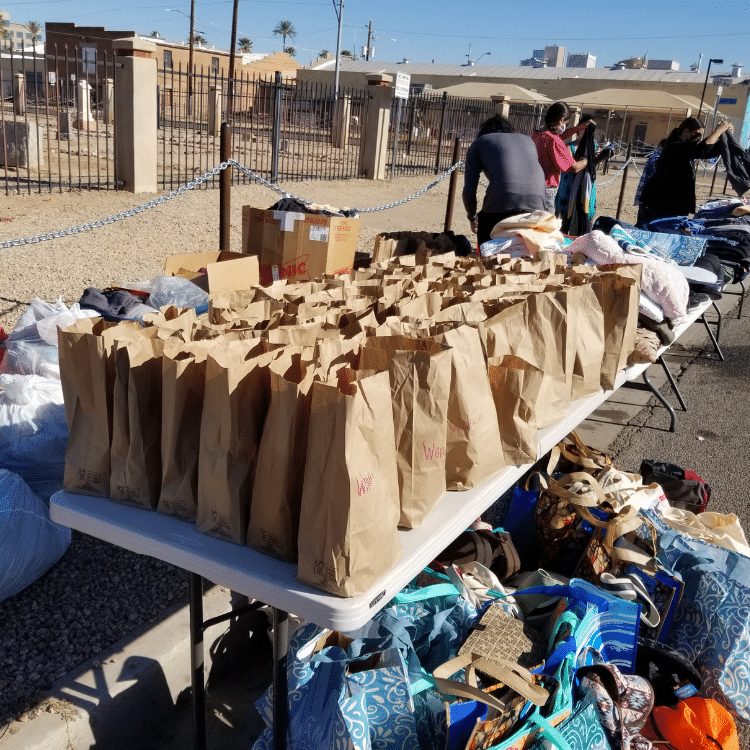

I am the co-founder of Seeds to Inspire Foundation, a non-profit organization located on the ancestral land of the Akimel O’odham and Piipaash, currently referred to as Phoenix, Arizona. I started Seeds to Inspire Foundation to transmute privilege into service and bring my healing story—and the knowledge behind it—to communities challenged with health inequity and disparity.
We are part of a large and enthusiastic plant-based social justice movement focused on whole system health and healing, and our mission is to provide nutrition education, culinary medicine interventions, and trauma-informed resources to the places where they are least accessible. We are a tribe of like-hearted and like-minded individuals; our ethos is that it is our duty of care to help those that do not share our privilege.
With the help of the T. Colin Campbell Center for Nutrition Studies’ Community Grants program, we launched the first Seva Jumpstart, a foundational part of our Community Lifestyle Wellness Initiative. Seva Jumpstart provides 10 days of whole plant foods to participants in our most distressed zip codes. Many of these participants are suffering from health issues commonly associated with poverty: excess weight, hypertension, diabetes, pain from inflammation, and more.
I have worked with the American College of Lifestyle Medicine’s member interest group called HEAL (Health Equity Achieved through Lifestyle Medicine), and through that experience, I have learned just how unaware I was of the history and consequences of health inequities in our communities. Though I am passionate about addressing health disparities that have been highlighted during this pandemic, I know that my work will remain incomplete unless I can better understand and learn from that history.

Seeds to Inspire Foundation builds on the six pillars of lifestyle medicine: nutrition, exercise, stress management, relationships, sleep, and avoiding all substance abuse. In addition to these six pillars, we are also committed to addressing the following factors affecting the health of our communities:
My own healing involved two paths: 1) healing from a lifetime of broken heart and mind; and 2) healing from a lifetime of consuming the flesh and reproductive byproducts of animals. Our work has evolved to bridge these two healing paths. In Fall 2021, Seeds to Inspire relaunched with a new community-engaged, trauma-informed lifestyle wellness initiative.
Why Community-Engaged?
Because we believe that no one knows you and your community better than you, and we believe our role is to support you in your healing journey rather than imposing our answers on your community. Our goal is to bring powerful tools that nourish the resilience within you and your community. In other words, we want to help you build on the assets already within your community.
Why Trauma-Informed?
A trauma-informed approach is one that understands and considers the pervasive nature of trauma and promotes environments of healing and recovery rather than practices and services that may inadvertently re-traumatize. The combination of lifestyle medicine with trauma healing is more powerful than either intervention on its own. I have experienced this powerful combination in my own healing journey.
I realized I couldn’t walk the path of “healer” if I did not take into consideration the history of trauma affecting the communities I was trying to help. There are specific cultural and societal challenges that have created barriers to health and wellness. Attempting to improve health and wellness without acknowledging and addressing those challenges is an incomplete, insufficient, and frankly disingenuous approach.
In meeting with the community and listening closely to what was being expressed, I discovered many individuals who were interested in my healing journey. There were those with family members who have suffered or feared suffering from the Western dietary lifestyle, as well as those facing imminent and dire consequences from that lifestyle. Seva Jumpstart came from a need to respond to these people, many of whom have reached out to me over Instagram and Facebook.

Seva Jumpstart is an opportunity for these individuals to see in real time the power of plants. In addition to the support of a medical professional who can help to answer their questions and explain the healing they are experiencing, they are also provided with culturally relevant food. The CNS Community Grants program is allowing us to bring this intensive, evidence-based program to so many people—the mother of a 6-year-old who is suffering from obesity and an uncontrollable bladder; a woman in her 50s who was told if she did not make major changes she would not see another holiday season; a community leader who is determined to face his cancer holistically.
We’re excited to witness the long-term benefits that our participants will experience. Some have already seen immediate improvements. One participant described how her knee felt better during and after the Jumpstart, while another reported mid-way through the program that, “eating this way feels natural. I feel right about eating this way.”
Seva Jumpstart is only one part of our Community Lifestyle Wellness Initiative. We also have the privilege of offering two For for Life programs from the Physicians Committee for Responsible Medicine (PCRM): Native Food For Life and African American Culinary Heritage. In the spring, we will be inviting the community to support their local plant-centric social entrepreneurs and healers at a co-sponsored event called Soulful Vegan Experience. We are collaborating with doulas to bring a plant-based program to mothers of infants and toddlers, as well as expecting moms. These are all opportunities for our community members to collectively invite culinary medicine and nutrition education into their lives, which is something we are extremely excited to be able to help facilitate.
I believe I can speak for all of the amazing individuals in the Seeds to Inspire tribe when I say that we would love for the organization to become obsolete. What a wonderful world it would be if every institution—every daycare, preschool, nursing home, hospital, and healing center—in every at-risk zip code ate a diet of predominantly plant-based, organic, locally grown foods. A future where community kitchens and co-ops replace what were once fast food restaurants and clinics; where children are happy, healthy, and nurtured by an abundance of thriving elder wisdom in compassionate, regenerative villages; where dietary diseases are things of the past, and we have remembered how to be members of life on this planet.
To help bring a Seva Jumpstart into every at-risk zip code and support this vision, we would love to connect with plant-based cooks, restaurants, and businesses. We also collect clothing and shelf-stable plant-based snacks for members of our unhoused, displaced population. To those who are interested in donating physical goods for that initiative, please reach out to us. However, the best way to help us serve our communities is by becoming a monthly sponsor. Our goal is to have a community healing community. Help us launch as many Seva Jumpstarts as we can.
Visit www.seedstoinspire.com to learn more.
Copyright 2026 Center for Nutrition Studies. All rights reserved.